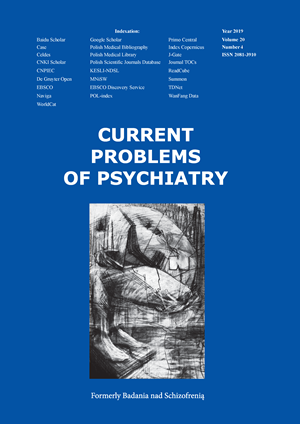Polycystic ovary syndrome and mental disorders – discussion on the recommendations of the European Society of Human Reproduction and Embryology (ESHRE)
DOI:
https://doi.org/10.2478/cpp-2019-0018Keywords:
polycystic ovary syndrome, psychiatric disorders, recommendationsAbstract
Introduction: Polycystic ovary syndrome (PCOS) is the most common endocrinopathy in women at the reproductive age. In 2018, the European Society of Human Reproduction and Embryology (ESHRE) developed and published new accurate recommendations for the diagnosis and management of women with PCOS. In this work, a separate chapter is devoted to the quality of life and mental disorders in patients with polycystic ovary syndrome.
Material and Methods: This article provides an overview of the literature regarding mental disorders associated with PCOS with the focus on the ESHRE recommendations.
Conclusion: The medical staff and patients should be aware of the negative impact of polycystic ovary syndrome on the quality of life, coexistence of depression, anxiety, psychosexual and eating disorders.
References
1. Rotterdam ESHRE/ASRM-Sponsored PCOS Consensus Workshop Group. Revised 2003 consensus on diagnostic criteria and long-term health risk related to polycystic ovary syndrome. Fertil. Steril. 2004; 81 (1): 19-25. https://doi.org/10.1016/j.fertnstert.2003.10.004
2. National Institutes of Health Evidence-based methodology workshop on polycystic ovary syndrome, December 3-5, 2012. Executive summary. https://prevention.nih.gov/docs/ programs/pcos/FinalReport.pdf.
3. Fauser BC, Tarlatzis BC, Rebar RW, Legro RS, Balen AH, Lobo R, et al. Consensus on women's health aspects of polycystic ovary syndrome (PCOS): the Amsterdam ESHRE/ASRM-Sponsored 3rd PCOS Consensus Workshop Group. Fertil. Steril. 2012; 97 (1): 28-38.e25 https://doi.org/10.1016/j.fertnstert.2011.09.024
4. Teede HJ, Misso ML, Costello MF, Dokras A, Laven J, Moran L, et al. International PCOS Network. Recommendations from the international evidence-based guideline for the assessment and management of polycystic ovary syndrome. Hum. Reprod. 2018; 33 (9): 1602-1618.
5. Hollinrake, E., Abreu A, Maifeld M, Van Voorhis BJ, Dokras A. Increased risk of depressive disorders in women with polycystic ovary syndrome. Fertil Steril. 2007: 87 (6): 1369-76. https://doi.org/10.1016/j.fertnstert.2006.11.039
6. Karacan, E., Caglar GS, Gürsoy AY, Yilmaz MB. Body Satisfaction and Eating Attitudes among Girls and Young Women with and without Polycystic Ovary Syndrome. Journal of Pediatric and Adolescent Gynecology. 2014. 27 (2): 72-77. https://doi.org/10.1016/j.jpag.2013.08.003
7. Siu, AL and USPSTF on behalf of the United States. Annals of Internal Medicine. 2016. 164 (5): 360-366. https://doi.org/10.7326/M15-2957
8. Larsson, I., Hulthén L, Landén M, Palsson E, Janson P, Stener- Victorin E. Dietary intake, resting energy expenditure, and eating behavior in women with and without polycystic ovary syndrome. Clinical Nutrition. 2016; 35 (1): 213-218. https://doi.org/10.1016/j.clnu.2015.02.006
9. National Guideline Alliance, NICE Guideline. Eating Disorders: recognition and treatment. Methods, evidence and recommendations. Draft. 2016, National Institute for Health and Care Excellence: London.
Downloads
Published
Issue
Section
License
Copyright (c) 2019 Authors

This work is licensed under a Creative Commons Attribution-NonCommercial-NoDerivatives 3.0 Unported License.


